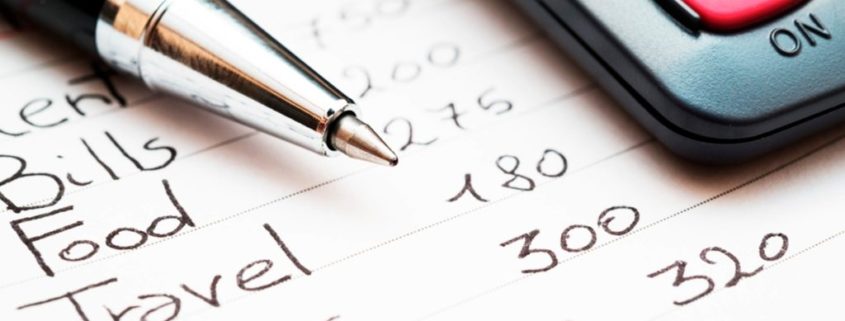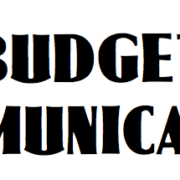Value Added Tax will be increased to twelve percent in a matter of days, and many of us are still trying to figure out how to make it work. Adjustments have to be made, some on a daily basis, but this does not mean we have to be uncomfortable. It means we have to plan, and we have to look at what we have.
Some people do not like to look at their money. Sure, they cash checks, make withdrawals, and make cash transactions, but they do not like to count the money they have and face what it means for their lives and lifestyles. They avoid it, at almost any cost.
When is the last time you checked your account balances? Do you know how much cash you have in your wallet and stashed in other locations?
Some of it could be laziness, but the reluctance to check balances is most often linked to fear and discomfort with facing the reality real numbers force upon us. If you know you have two hundred dollars for the next month, you may be forced to make some decisions about what and where you will be eating, how you will get around, and which invitations you can accept. If you do not know there is only two hundred dollars left in your wallet, you can go for sushi three times in ten days, grocery shop without a plan, and pick up that layaway without stress. Not knowing is false freedom, and it can feel good. Until the consequences creep up.
How are you approaching the twelve percent VAT and its impact on your purchasing power? Do you plan to operate as usual until you run out of money, or are you making a plan?
Changing the mindset
It may be helpful to view the increase in VAT as a pay cut. It has the same effect. You will not be able to buy the same items in the same quantity as before. Once you come to this realization, having a plan will probably feel more important.
It is a good idea to spend some time on a budget. No, budgeting is not fun for most people, but it can significantly reduce stress. Start with your income, then assess your necessities including your mortgage or rent and payments on debt. Keep in mind that every monthly bill is not a necessity. Yes, this is a direct attack on cable television, Netflix, and other subscriptions. These are luxuries and they belong in a separate column so you can identify them easily if and when you need to make adjustments to your spending.
Negotiating and eliminating expenses
What can you spend less on? If you usually buy lunch, figure out how many days you need to take lunch to work instead. You can not negotiate necessities, but how can you reduce the cost? Maybe it is time to move into a less expensive apartment or get a roommate. We all need grocery and sometimes we need to get that hard-to-find ingredient, but we do not need to buy everything from the most expensive store.
One of the ways we can begin to work around VAT, eat better, and live more sustainably is growing our own food. We may not be able to produce everything for ourselves, but we can at least grow fruit, vegetables, and herbs. It does not have to take up a lot of space, and there are even options for people living in apartments with no ability to plant in the ground. A few years ago, I bought a hanging garden from a friend who put them together for clients. The twelve plants included green pepper, onion, Bahamian spinach, and rosemary. I hung it on a fence, watered it as instructed, and watched my food grow. The next year, I sourced my own seeds and seedlings and set about it again. There is really no satisfaction like eating food you have grown yourself, VAT-free. We all know people who garden. Talk to them, ask for a little something to get started, and get to work.
Let’s make a deal
On the same day the 60 percent increase in VAT was announced, bartering became a serious topic among groups of friends and acquaintances. Bartering is not over. Many people barter all the time without realizing it. Civil society organizations often exchange meals for hours of service. People do not mind spending an hour or two at a booth or packing welcome bags if they get lunch and a networking opportunity in exchange. People in the beauty industry exchange services among themselves — a massage for makeup application, for example. No money is exchanged, but two parties exchange products and services of equal value. This is bartering, and it is time to be more intentional about it. What do you need, and what you can provide in exchange? Check out the bartering groups on Facebook, start the conversation within your own networks, and reduce the amount of money you spend on services when you can trade skills.
Sacrifice to save
Saving money is difficult under any circumstances. No one really wants to set money aside for short-term or long-term savings instead of spending it on immediate desires. Many of us are living hand-to-mouth with little or no room to save. Where saving is a possibility, it definitely requires lifestyle changes. If you can afford to buy a hot beverage every day on the way to work, you can save. If you can drive to and from work every day, you can save. It may not been convenient, and it may cramp your style, but you can do it. Make your morning beverage at home, put that café money in a jar every day, and deposit it monthly. Carpool with your family members, friends, and coworkers. It could be part of a go-green initiative at the office, or a way to catch up with the cousins you never find the time to meet. This may not be something you do all the time, but it is an option for reducing spending on gas.
There are a number of saving strategies that come up with a quick online search. A popular one is never spending five dollar bills. Any time you get a five dollar bill in change, you put it in a separate section of your wallet or a different pocket, then deposit it to a container or account. Do this for a year, and see how much you save. If you are inclined to open a savings account, check out the credit unions. They offer far better interest rates and service than commercial banks, and the asue accounts are definitely worth consideration.
Community
We are all paying the same VAT, but we all have different income levels. No matter how much we would like to think we are all in the same boat, we are not. Women and approximately twelve percent of people in The Bahamas living below the poverty line are disproportionately affected. Some can not even begin to think about budgets or saving. Look out for them.
This unfortunate increase is coming, but maybe a better sense of community and willingness to help one another can come with it. Can you help someone start a business? Maybe you have raw material to help them get started, a space they can work from, or money they can pay back in service. Check in with your loved ones. Make strategies for dealing with the VAT increase a community effort. Grow food together. Exchange goods and services. Start a savings challenge. Let’s get creative.
Published in The Tribune on June 27, 2018.








Leave a Reply
Want to join the discussion?Feel free to contribute!